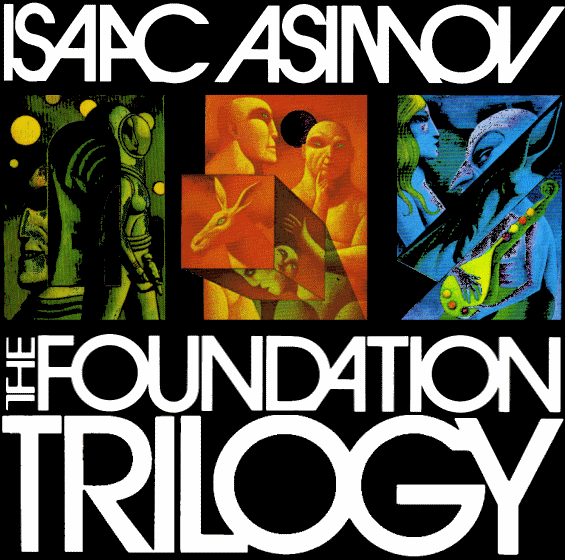
Last year Jonathan Nolan–screenwriter of Memento and Interstellar and not coincidentally director Christopher Nolan’s brother–announced that he would be developing Isaac Asimov’s legendary Foundation trilogy for HBO as a series. And we assume he’s still doing that, because there’s been nary a peep from the channel since. So far the Internet consensus has been a collective “well, that could be good!” instead of groans, which is a heartening thing these days.
For those who haven’t read the classic books, but would like to get the jump on ol’ Nolan, we submit this BBC Radio production from 1973, which is now available on Spotify below. (Download Spotify software here.) The recording also lives on Archive.org as well.
Right from the beginning we know we are in good hands, with the analog drones of the BBC Radiophonic Workshop ushering us into a stereo landscape filled with plummy British accents and atmospheric sound effects. It’s like the best ever episode of Doctor Who without a Tardis, corridors, or the enfeebled cries of a lost companion.
The Foundation Trilogy is heavily indebted to Edward Gibbon’s The History of the Decline and Fall of the Roman Empire, as well as a belief in the circular nature of history.
Asimov’s hero in the first book, Hari Seldon, using a science called psychohistory, can see the inevitable collapse of the Galactic Empire in which he lives and sets about trying to change it by setting up an opposition called the Foundation. The novels then jump decades ahead, checking in with this essential conflict, much like Gibbon’s work goes from emperor to emperor, marking the decline of empire and its inevitability. Free of aliens and shoot-em-ups, Foundation is very human despite its galactic scope.
Adapted by Patrick Tull and Mike Stott, the eight part radio series does a good job of presenting the novels as a character-driven drama, and while it is talky (it’s radio after all), it was Orson Scott Card who said of Foundation, it is “all talk, no action — but Asimov’s talk is action.”
It also influenced many future sci-fi writers. No doubt somewhere along the way Douglas Adams was listening to the radio play’s talking encyclopedia and thinking, hmm, what if this had jokes?
And once you get through the trilogy–maybe after an eight-hour flight?–there’s more Asimov radio plays for your listening pleasure on Spotify: Hostess, Pebble in the Sky, and Nightfall.
If you would like to sign up for Open Culture’s free email newsletter, please find it here. It’s a great way to see our new posts, all bundled in one email, each day.
If you would like to support the mission of Open Culture, consider making a donation to our site. It’s hard to rely 100% on ads, and your contributions will help us continue providing the best free cultural and educational materials to learners everywhere. You can contribute through PayPal, Patreon, and Venmo (@openculture). Thanks!
Related Content:
Isaac Asimov’s Favorite Story “The Last Question” Read by Isaac Asimov— and by Leonard Nimoy
Two Documentaries Introduce Delia Derbyshire, the Pioneer in Electronic Music
1,000 Free Audio Books: Download Great Books for FreeTed Mills is a freelance writer on the arts who currently hosts the FunkZone Podcast. You can also follow him on Twitter at @tedmills, read his other arts writing at tedmills.com and/or watch his films here.


Asimov is for thinking people. There are no shoot-em-up-bang-bangs, which is why his books don’t have mass appeal. It’s too bad, but you can see how the “media” world treats his material when you watch the movie “I Robot.” They had to put the “action” into it to get it to sell. They’ve done the same thing to Tolkien’s “The Hobbit,” by throwing in all kinds of “action scenes.” I just hope they don’t butcher “The Foundation Trilogy” that way.
It doesnt work, sorry
definately a thinking person’s read. No CGI needed and certainly no action scenes. You can draw the same conclusions to Discworld as well. The reader“s imagination does all of the hard work. Cinema; nope. No seduction needed for me.
Please please please, before I’m dead, someone produce this trilogy and base the screenplay on the books!! One of the greatest SF trilogies ever. I live by one of Salvor Hardin’s epigrams…that is how much influence this author had on my life!
If condescension is your only response to a work of literature, you are sad.
Absolutely the very best sci-fi series of all time. I’ve read ALL the foundation books multiple times. It explodes the imagination like no other. It was so innovative and captivating that it actually created a new book award as it was awarded the 1st Hugo Award.
If movies were made true to the books it would dwarf Star Wars.